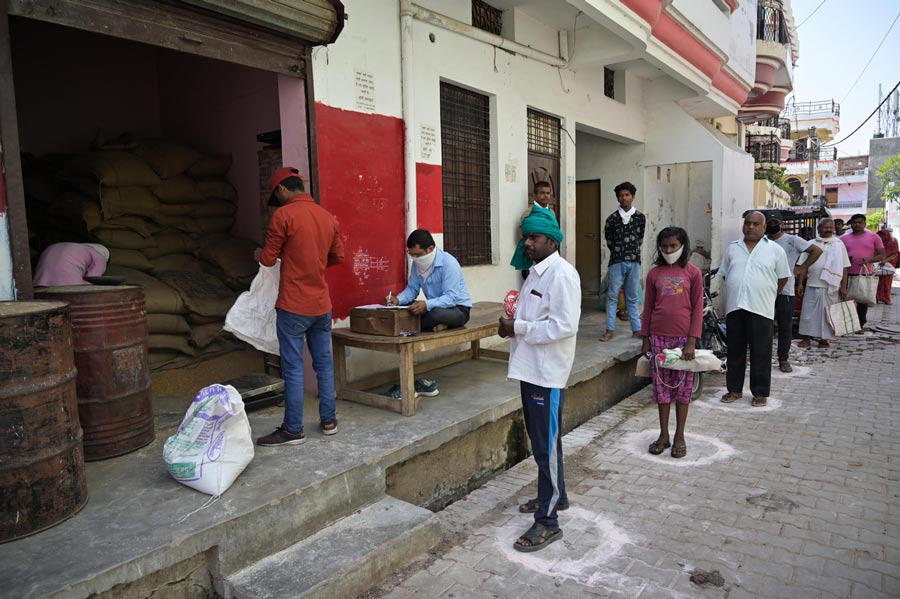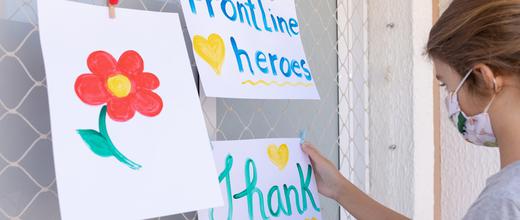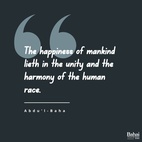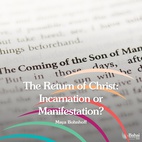The views expressed in our content reflect individual perspectives and do not represent the authoritative views of the Baha'i Faith.
With the coronavirus spreading rapidly around the planet, we might find ourselves stuck at home —and stuck as to how to respond, too.
Initially, the numbers world-wide seemed small, and many had hope for quick containment, like what happened with SARS and MERS, the two most recent coronaviruses. Also, the statistics didn’t immediately alarm everyone, with many experts describing a 2% or lower mortality rate.
But when the virus hit Italy, and hospitals began to overflow with critically-ill patients, alarm bells began to go off around the world.
Today, most people worldwide are either social distancing or self-isolating. For some, the impact of the virus may mean no more than staying at home with a full cupboard of food catching up on their favorite television series. For others, such as the poor of India and many other countries, the consequences have become much more grave, with large distances to travel on foot back to home villages, a journey sustained with little if any food.

So, what should our reaction be? From my reading of the Baha’i teachings, we can identify two seemingly opposing approaches, which in actuality comprise two seamless features of an integrated approach to life: detachment and compassion.
Throughout his writings, Baha’u’llah, like Buddha, urged us to detach ourselves from this world. The world, inherently full of suffering, presents us with a new test, trial or tribulation each day. Though people’s lot in this world differs drastically, with some living on a dollar a day while others hoard billions, no one can escape the pain of life. Even the money of the wealthy cannot stave off the pain of loss or the misery of meaninglessness. This all goes to show that pain forms an inherent part of our physical existence.
In the volume “The Hidden Words,” Baha’u’llah explained the importance of rising above the material world:
O Friends! Abandon not the everlasting beauty for a beauty that must die, and set not your affections on this mortal world of dust.
O Son of Being! If thine heart be set upon this eternal, imperishable dominion, and this ancient, everlasting life, forsake this mortal and fleeting sovereignty.
The way that Baha’is detach is not simply through negation — it is through attraction and affirmation. The Baha’i teachings recommend detaching from the world by attaching ourselves to God. Baha’u’llah wrote:
For every one of you his paramount duty is to choose for himself that on which no other may infringe and none usurp from him. Such a thing — and to this the Almighty is My witness — is the love of God, could ye but perceive it.
Through loving God we can rise above the misery of material existence in the here and now. Detachment also gives us faith in the certainty that our ultimate fear — death — is nothing to fear. — What it actually entails is shedding this outer skin of the body and soaring towards our higher destiny, God. Of this, Baha’u’llah wrote:
O Son of the Supreme! I have made death a messenger of joy to thee. Wherefore dost thou grieve? I made the light to shed on thee its splendor. Why dost thou veil thyself therefrom? –
Attachment to God and detachment from the world helps us regain composure when faced with trials, including our own potential passing away. But what of our reaction to other’s woes?
While we rise above the problems of the world, interestingly, we can still be deeply concerned with them. More importantly, we can still feel a very profound, humanitarian sense of compassion for other peoples’ suffering. Abdu’l‑Baha constantly urged us to “… have respect and consideration one for another and show loving-kindness and tender regard to all the peoples of the world.”
One of the reasons that we feel compassion for others is that God has created this life for us to meaningfully engage with. Existence is not a haphazard, chance occurrence devoid of meaning and purpose. Rather, it is a purpose-driven task of drawing nearer to God. We do this by improving ourselves and the world, which makes a huge part of this task serving others. In fact, Baha’u’llah wrote, “Blessed is he who preferreth his brother before himself.”
The Baha’i teachings ask us to not only care about others and have compassion for their situation but also to perform acts of service for them. In the words of Abdu’l‑Baha, we:
… must be as refreshing water to the thirsty, and to the sick, a swift remedy, a healing balm to those in pain and a solace to every burdened heart … a guiding light to those who have gone astray, a sure leader for the lost.
But what does service look like in the current situation, when most of us need to social distance or even self-isolate? How can we show our concern for others at this unusual moment? Emma Joyce, writing in the Guardian Australia, suggested a number of kind actions we could all take:
- Volunteering through an organization like the Red Cross
- Offering services to neighbors such as taking their dog for a walk
- Donating blood
- Adopting a healthcare worker (bake them a cake, buy them a coffee)
You can probably think of many more things we can add to this list:
- With a shortage of face masks, we could sew masks at home for others.
- Donate food to a food bank to help homeless people
- Donate money to countries that lack the medical systems and supplies to adequately deal with this virus
- Or as the Universal House of Justice recently wrote, if we can do nothing else, we can pray for the alleviation of people’s suffering, which if we believe in God’s mercy and compassion, is an immensely powerful thing.
Finally, we can learn two important lessons from the pandemic that currently threatens the sick and the poor, who are the most vulnerable in the world: the need to simultaneously rise above our material concerns, and at the very same time, care more about others. Interestingly, when we feel less absorbed in our own worries and concerns, we have more space to care about others.

















Comments
Sign in or create an account
Continue with Facebookor